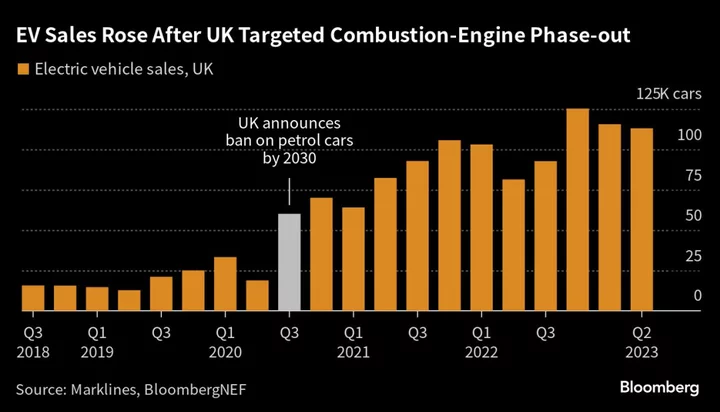Rishi Sunak’s plans to backtrack on green policies will put the UK’s 2050 net zero target in jeopardy, derailing Britain’s role as a global climate leader.
While the prime minister says he is committed to hitting the legally binding net zero target, rolling back a 2030 ban on new petrol and diesel cars and watering down policies to get natural gas out of home heating, would leave him with very few options.
“This will crash the UK’s carbon budgets,” said Richard Hebditch, UK director of the campaign group Transport & Environment UK. “The 2030 ban on the sale of new petrol and diesel vehicles, and the accompanying zero emissions vehicle mandate, is the biggest carbon cutting measure in the net zero strategy.”
Sunak is due to confirm the plans later this week. He is expected to argue that Britain has over-delivered on the fight against climate change, and that other countries should do more, according to the British Broadcasting Corp. The timing is significant, coming as other global leaders gather in New York where they are renewing their commitment to meeting the Paris Agreement to limit global warming to well below 2 degrees celsius, striving for 1.5C.
According to Climate Action Tracker, a non-profit that assesses global climate policies, the UK is one of a handful of countries that is actually close to reaching a 1.5C pathway, although it isn’t there yet. Rolling back existing policies would push it further away from achieving that goal.
In New York, UN Secretary General Antonio Guterres on Tuesday called out inaction by the world’s richest 20 countries, warning current climate action is “falling abysmally short.” US President Joe Biden said the world urgently needed to reduce its dependence on fossil fuels.
“If Prime Minister Sunak — in London avoiding the global stage — does start watering down UK climate policies he is doing so against advice, and out of sync with the international consensus,” said Rachel Kyte, Dean Emerita, Fletcher School Tufts University and a former UN climate envoy. “Making net zero a scapegoat for years of the government mismanaging the the economy and energy policy is a dangerous stunt.”
Still, the UK isn’t the only major economy where politicians have looked at scaling back ambitious targets. Germany’s coalition, which includes the Green party, has watered down policies on home heating in the face of protests. Dutch politics has been rocked by opposition to plans to scale back emissions from farming. And Sweden, another global leader on climate policy, is also off track on meeting its long-term net zero target.
Sunak will likely argue the UK has overachieved on emissions, but his climate watchdog says otherwise. In June, the independent Climate Change Committee said Britain’s chances of achieving its climate goals are getting slimmer, just as the government should be accelerating efforts to hit its targets.
While the CCC said the ban on the sale of new fossil fuel cars was crucial in spurring the sale of electric cars, it urged the government to go further, by banning the sale of plug in hybrid cars as well. It also called for the government to confirm the details of its Zero Emissions Mandate that would set the level of uptake required for battery powered cars until 2035.
The CCC said emissions cuts need to roughly quadruple in the next seven years in order to meet 2030 climate goals outside of the power industry. Within electricity supply, the UK’s development of wind farms isn’t moving fast enough and the growth of solar facilities is “significantly off track”. That was highlighted earlier this month, when the UK’s renewable energy auction flopped, with no offshore wind farm developers bidding to build new projects, derailing the UK’s plan to have 50 gigawatts of new capacity by 2050. Meanwhile, the CCC also criticized Sunak’s decision to boost oil and gas exploration in the North Sea and approve a new coal mine in Cumbria.
Sunak’s plan to roll back climate targets quickly spooked investors, who had seen the UK’s political consensus on climate as a strength. Part of the problem is that Sunak is ditching policies that were announced just three years ago by his predecessor and fellow Conservative Boris Johnson.
“Our business needs three things from the UK government: ambition, commitment and consistency. A relaxation of 2030 would undermine all three, said Lisa Brankin, chair of Ford UK, which is investing £430 million in new electric vehicle manufacturing in the UK.
Only last week BMW AG announced plans to invest £600 million ($744 million) into its factory in Oxford to make electric Minis, and as recently as July the cabinet minister Michael Gove said the 2030 ban on news gasoline and diesel cars was “immovable.”
Chris Southworth, secretary-general of the International Chamber of Commerce UK, said the announcement today would only delay much needed investment decisions.
“Our environmental commitments are not about forcing people to buy a new car or a new boiler in the middle of a cost-of-living crisis,” he said “They about clearly signaling to businesses, manufacturers, and investors that they need to be prioritizing the switch to green products now.”
--With assistance from Akshat Rathi and Eamon Akil Farhat.









